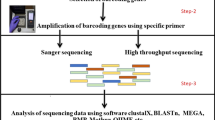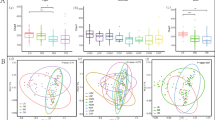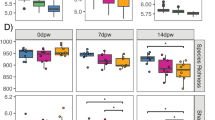Abstract
Penguins are one of the key components of the Antarctic ecosystem. Changes in penguin population size can indicate Antarctic ecosystem change. The two species of pygoscelid penguins, Adélie (Pygoscelis adeliae) and Gentoo (Pygoscelis papua) penguins, breed sympatrically on Ardley Island, King George Island, Antarctica. However, there has been an increase in the Gentoo penguin breeding population and a decline in the Adélie penguin breeding population on the island. Whether the difference in population fluctuations between the two penguin groups is connected to their diet remains uncertain. Herein, the 18S ribosomal ribonucleic acid (18S rRNA) and mitochondrial cytochrome c oxidase subunit I (COI) genes were sequenced from penguin feces using the Illumina MiSeq platform to investigate the fecal eukaryote composition of the two pygoscelid penguin groups to obtain insight into their diets. Significant differences in the abundance of Tardigrada and Rotifera sequences in the fecal eukaryote composition were observed between the Adélie and Gentoo groups. A range of food groups, including Actinopteri, Bivalvia, Coscinodiscophyceae, Florideophyceae, Haptophyceae, Hydrozoa, Malacostraca, and Phaeophyceae, were discovered in the penguin diets. Euphausia was the most important component of the diets of both Pygoscelis penguins. Compared with Adélie penguins, which showed a higher abundance of Actinopteri, Gentoo penguins presented a higher percentage of Euphausiidae in their diet. The COI gene is a more suitable taxonomic marker than the 18S rRNA gene for the dietary analysis of penguins. The results allowed the dietary components of Adélie and Gentoo penguins on Ardley Island to be characterized.





Similar content being viewed by others
References
Bråte J, Klaveness D, Rygh T, Jakobsen KS, Shalchian-Tabrizi K (2010) Telonemia-specific environmental 18S rDNA PCR reveals unknown diversity and multiple marine-freshwater colonizations. BMC Microbiol 10:168. https://doi.org/10.1186/1471-2180-10-168
Cavalier-Smith T, Lewis R, Chao EE, Oates B, Bass D (2009) Helkesimastix marinan. sp. (Cercozoa: Sainouroidea superfam. n.) a gliding zooflagellate of novel ultrastructure and unusual ciliary behaviour. Protist 160:452–479. https://doi.org/10.1016/j.protis.2009.03.003
Cho SM, Kim S, Cho H, Lee H, Lee JH, Lee H, Park H, Kang S, Choi HG, Lee J (2019) Type II ice-binding proteins isolated from an Arctic microalga are similar to adhesin-like proteins and increase freezing tolerance in transgenic plants. Plant Cell Physiol 60:2744–2757. https://doi.org/10.1093/pcp/pcz162
Cimino MA, Moline MA, Fraser WR, Patterson-Fraser DL, Oliver MJ (2016) Climate-driven sympatry may not lead to foraging competition between congeneric top-predators. Sci Rep 6:18820. https://doi.org/10.1038/srep18820
Cox F, Newsham KK, Bol R, Dungait JA, Robinson CH (2016) Not poles apart: Antarctic soil fungal communities show similarities to those of the distant Arctic. Ecol Lett 19:528–536. https://doi.org/10.1111/ele.12587
Dantas G, Oliveira L, Marasco A, Araujo J, Hurtado R, Durigon E, Fillipo L, Morgante J (2014) Demographic history of the Gentoo penguin (Pygoscelis papua) and the Adélie penguin (Pygoscelis adeliae) on Admiralty Bay, King George Island, Antarctica. Waterbirds 37:410–418. https://doi.org/10.1675/063.037.0408
Deagle BE, Gales NJ, Evans K, Jarman SN, Robinson S, Trebilco R, Hindell MA (2007) Studying seabird diet through genetic analysis of faeces: a case study on macaroni penguins (Eudyptes chrysolophus). PLoS ONE 2:e831. https://doi.org/10.1371/journal.pone.0000831
Deagle BE, Chiaradia A, McInnes I, Jarman SN (2010) Pyrosequencing faecal DNA to determine diet of little penguins: is what goes in what comes out? Conserv Genet 11:2039–2048. https://doi.org/10.1007/s10592-010-0096-6
Dufková K, Barták M, Morkusová J, Elster J, Hájek J (2019) Screening of growth phases of Antarctic algae and cyanobacteria cultivated on agar plates by chlorophyll fluorescence imaging. Czech Polar Rep 9:170–181. https://doi.org/10.5817/CPR2019-2-15
Dunn MJ, Jackson JA, Adlard S, Lynnes AS, Briggs DR, Fox D, Waluda CM (2016) Population size and decadal trends of three penguin species nesting at Signy Island, South Orkney Islands. Plos ONE 11(10):e0164025. https://doi.org/10.1371/journal.pone.0164025
Favero M, Coria NB (2007) Feeding aggregation and diets of seabirds at Gerlache Strait, Antarctica. Acta Zool Sin 53(3):425–430. https://doi.org/10.1016/S1005-8885(07)60162-9
Garrido-Benavent I, Pérez-Ortega S, de Los RA (2017) From Alaska to Antarctica: species boundaries and genetic diversity of Prasiola (Trebouxiophyceae), a foliose chlorophyte associated with the bipolar lichen-forming fungus Mastodia tessellata. Mol Phylogenet Evol 107:117–131. https://doi.org/10.1016/j.ympev.2016.10.013
Geller J, Meyer C, Parker M, Hawk H (2013) Redesign of PCR primers for mitochondrial cytochrome c oxidase subunit I for marine invertebrates and application in all-taxa biotic surveys. Mol Ecol Resour 13:851–861. https://doi.org/10.1111/1755-0998.12138
Heesch S, Pažoutová M, Moniz MBJ, Rindi F (2016) Prasiolales (Trebouxiophyceae, Chlorophyta) of the Svalbard archipelago: diversity, biogeography and description of the new genera Prasionella and Prasionema. Eur J Phycol 51:171–187. https://doi.org/10.1080/09670262.2015.1115557
Hinke JT, Cossio AM, Goebel ME, Reiss CS, Trivelpiece WZ, Watters GM (2017) Identifying risk: concurrent overlap of the Antarctic krill fishery with krill-dependent predators in the Scotia Sea. PLoS ONE 12(1):e0170132. https://doi.org/10.1371/journal.pone.0170132
Höss M, Kohn M, Pääbo S, Knauer F, Schröder W (1992) Excrement analysis by PCR. Nature 359(6392):199. https://doi.org/10.1038/359199a0
Jarman SN, Deagle BE, Gales NJ (2004) Group-specific polymerase chain reaction for DNA-based analysis of species diversity and identity in dietary samples. Mol Ecol 13:1313–1322. https://doi.org/10.1111/j.1365-294X.2004.02109.x
Jarman SN, McInnes JC, Faux C, Polanowski AM, Marthick J, Deagle BE, Southwell C, Emmerson L (2013) Adélie penguin population diet monitoring by analysis of food DNA in scats. PLoS ONE 8:e82227. https://doi.org/10.1371/journal.pone.0082227
Juáres MA, Santos MM, Negrete J, Santos MR, Mennucci JA, Rombolá E, Longarzo L, Coria NR, Carlini AR (2013) Better late than never? Interannual and seasonal variability in breeding chronology of gentoo penguins at stranger point, Antarctica. Polar Res 32:18448. https://doi.org/10.3402/polar.v32i0.18448
Juáres MA, Santos M, Mennucci JA, Coria NR, Mariano-Jelicich R (2016) Diet composition and foraging habitats of Adélie and gentoo penguins in three different stages of their annual cycle. Mar Biol 163:105. https://doi.org/10.1007/s00227-016-2886-y
Juáres MA, Casaux R, Corbalán A, Blanco G, Pereira A, Perchivale PJ, Coria NR, Mercedes Santo M (2018) Diet of Adélie penguins (Pygoscelis adeliae) at Stranger Point (25 de Mayo/King George Island, Antarctica) over a 13-year period (2003–2015). Polar Biol 41:303–311. https://doi.org/10.1007/s00300-017-2191-3
Jumpponen A, Newsham KK, Neises DJ (2003) Filamentous ascomycetes inhabiting the rhizoid environment of the liverwort cephaloziella varians in Antarctica are assessed by direct PCR and cloning. Mycologia 95:457–466
Kock K-H (1985) Krill consumption by Antarctic notothenioid fish. In: Siegfried WR, Condy PR, Laws RM (eds) Antarctic nutrient cycles and food webs. Proc. 4th SCAR symposium on Antarctic biology, Springer, Berlin Heidelberg New York, pp 437–444. https://doi.org/10.1007/978-3-642-82275-9_61
Lemieux C, Otis C, Turmel M (2016) Comparative chloroplast genome analyses of streptophyte green algae uncover major structural alterations in the Klebsormidiophyceae Coleochaetophyceae and Zygnematophyceae. Front Plant Sci 7:697. https://doi.org/10.3389/fpls.2016.00697
Leray M, Yang JY, Meyer CP, Mills SC, Agudelo N, Ranwez V, Boehm JT, Machida RJ (2013) A new versatile primer set targeting a short fragment of the mitochondrial COI region for metabarcoding metazoan diversity: application for characterizing coral reef fish gut contents. Front Zool 10:34. https://doi.org/10.1186/1742-9994-10-34
Luo W, Li H, Gao S, Yu Y, Lin L, Zeng Y (2016) Molecular diversity of microbial eukaryotes in sea water from Fildes Peninsula, King George Island, Antarctica. Polar Biol 39:605–616. https://doi.org/10.1007/s00300-015-1815-8
Lynch HJ, Naveen R, Trathan PN, Fagan WF (2012) Spatially integrated assessment reveals widespread changes in penguin populations on the Antarctic Peninsula. Ecology 93:1367–1377. https://doi.org/10.1890/11-1588.1
Mayzaud P, Boutoute M, Alonzo F (2003) Lipid composition of the euphausiids Euphausia vallentini and Thysanoessa macrura during summer in the Southern Indian Ocean. Antarct Sci 15:463–475. https://doi.org/10.1017/S0954102003001573
McInnes SJ (1995) Tardigrades from Signy Island, South Orkney Islands, with particular reference to freshwater species. J Nat Hist 29:1419–1445. https://doi.org/10.1080/00222939500770601
McInnes JC, Emmerson L, Southwell C, Faux C, Jarman SN (2016) Simultaneous DNA-based diet analysis of breeding, non-breeding and chick Adélie penguins. R Soc Open Sci 3:150443. https://doi.org/10.1098/rsos.150443
Miller AK, Trivelpiece WZ (2008) Chinstrap penguins alter foraging and diving behavior in response to the size of their principle prey, Antarctic krill. Mar Biol 154:201–208. https://doi.org/10.1007/s00227-008-0909-z
Morley SA, Barnes DKA, Dunn MJ (2019) Predicting which species succeed in climate-forced polar seas. Front Mar Sci 5:507. https://doi.org/10.3389/fmars.2018.00507
Murray DC, Bunce M, Cannell BL, Oliver R, Houston J, White NE, Barrero RA, Bellgard MI, Haile J (2011) DNA-based faecal dietary analysis: a comparison of qPCR and high throughput sequencing approaches. PLoS ONE 6:e25776. https://doi.org/10.1371/journal.pone.0025776
Obbels D, Verleyen E, Mano MJ, Namsaraev Z, Sweetlove M, Tytgat B, Fernandez-Carazo R, De Wever A, D’hondt S, Ertz D, Elster J, Sabbe K, Willems A, Wilmotte A, Vyverman W (2016) Bacterial and eukaryotic biodiversity patterns in terrestrial and aquatic habitats in the Sør Rondane Mountains, Dronning Maud Land, East Antarctica. FEMS Microbiol Ecol 92:41. https://doi.org/10.1093/femsec/fiw041
Panasiuk A, Wawrzynek-Borejko J, Musiał A, Korczak-Abshire M (2020) Pygoscelis penguin diets on King George Island, South Shetland Islands, with a special focus on the krill Euphausia superba. Antarct Sci 32:21–28. https://doi.org/10.1017/S0954102019000543
Peña Cantero ÁL, Sentandreu V, Latorre A (2010) Phylogenetic relationships of the endemic Antarctic benthic hydroids (Cnidaria, Hydrozoa): what does the mitochondrial 16S rRNA tell us about it? Polar Biol 33:41–57. https://doi.org/10.1007/s00300-009-0683-5
Peter HU, Braun C, Janowski S, Nordt A, Nordt A, Stelter M (2013) The current environmental situation and proposals for the management of the Fildes Peninsula Region. http://www.uba.de/uba-info-medien-e/4424.html. Accessed on 15 Feb 2013
Polito M, Trivelpiece W, Patterson W, Karnovsky N, Reiss C, Emslie S (2015) Contrasting specialist and generalist patterns facilitate foraging niche partitioning in sympatric populations of Pygoscelis penguins. Mar Ecol Prog Ser 519:221–237. https://doi.org/10.3354/meps11095
Puddicombe RA, Johnstone GW (1988) The breeding season diet of Adélie penguins at the Vestfold Hills, East Antarctica. Hydrobiologia 165:239–253. https://doi.org/10.1007/BF00025593
Raymond JA, Morgan-Kiss R, Stahl-Rommel S (2020) Glycerol is an osmoprotectant in two Antarctic Chlamydomonas species from an ice-covered saline lake and is synthesized by an unusual bidomain enzyme. Front Plant Sci 11:1259. https://doi.org/10.3389/fpls.2020.01259
Reiss CS, Cossio AM, Loeb V, Demer DA (2008) Variations in the biomass of Antarctic krill (Euphausia superba) around the South Shetland Islands, 1996–2006. ICES J Mar Sci 65:497–508. https://doi.org/10.1093/icesjms/fsn033
Ridoux V (1988) Subantarctic krill, Euphausia vallentini Stebbing, preyed upon by penguins around Crozet Islands (Southern Indian Ocean): population structure and annual cycle. J Plank Res 10:675–690. https://doi.org/10.1093/plankt/10.4.675
Roberts SJ, Monien P, Foster LC, Loftfield J, Hocking EP, Schnetger B, Pearson EJ, Juggins S, Fretwell P, Ireland L, Ochyra R, Haworth AR, Allen CS, Moreton SG, Davies SJ, Brumsack HJ, Bentley MJ, Hodgson DA (2017) Past penguin colony responses to explosive volcanism on the Antarctic Peninsula. Nat Commun 8:14914. https://doi.org/10.1038/ncomms14914
Romeike J, Friedl T, Helms G, Ott S (2002) Genetic diversity of algal and fungal partners in four species of Umbilicaria (Lichenized Ascomycetes) along a transect of the Antarctic peninsula. Mol Biol Evol 19:1209–1217. https://doi.org/10.1093/oxfordjournals.molbev.a004181
Shmakova L, Malavin S, Iakovenko N, Vishnivetskaya T, Shain D, Plewka M, Rivkina E (2021) A living bdelloid rotifer from 24,000-year-old Arctic permafrost. Curr Biol 31:R712–R713. https://doi.org/10.1016/j.cub.2021.04.077
Sieburth JM (1961) Antibiotic properties of acrylic acid, a factor in the gastrointestinal antibiosis of polar marine animals. J Bacteriol 82:72–79. https://doi.org/10.1128/jb.82.1.72-79.1961
Stepnik R (1982) All-year population studies of Euphausiacea (Crustacea) in the Admiralty Bay (King George Island, South Shetland Island, Antarctic). Pol Polar Res 3:49–68
Suh SS, Hong JM, Kim EJ, Jung SW, Kim SM, Kim JE, Kim IC, Kim S (2018) Anti-inflammation and anti-cancer activity of ethanol extract of Antarctic freshwater microalga, Micractinium sp. Int J Med Sci 15:929–936. https://doi.org/10.7150/ijms.26410
Tabassum N, Lee JH, Lee SR, Kim JU, Park H, Kim HW, Kim JH (2022) Molecular diet analysis of Adélie penguins (Pygoscelis adeliae) in the Ross Sea using fecal DNA. Biology (basel) 11(2):182. https://doi.org/10.3390/biology11020182
Thiebot JB, Ito K, Raclot T, Poupart T, Kato A, Ropert-Coudert Y, Takahashi A (2016) On the significance of Antarctic jellyfish as food for Adélie penguins, as revealed by video loggers. Mar Biol 163:1–8. https://doi.org/10.1007/s00227-016-2890-2
Trivelpiece WZ, Trivelpiece SG, Volkman NJ (1987) Ecological segregation of adelie, gentoo, and chinstrap penguins at King George Island, Antarctica. Ecology 68:351–361. https://doi.org/10.2307/1939266
Trivelpiece WZ, Hinke JT, Miller AK, Reiss CS, Trivelpiece SG, Watters GM (2011) Variability in krill biomass links harvesting and climate warming to penguin population changes in Antarctica. Proc Natl Acad Sci U S A 108(18):7625–7628. https://doi.org/10.1073/pnas.1016560108
Tschitschko B, Williams TJ, Allen MA, Zhong L, Raftery MJ, Cavicchioli R (2016) Ecophysiological distinctions of Haloarchaea from a hypersaline Antarctic lake as determined by metaproteomics. Appl Environ Microbiol 82:3165–3173. https://doi.org/10.1128/AEM.00473-16
Tsujimoto M, Suzuki AC, Imura S (2015) Life history of the Antarctic tardigrade, Acutuncus antarcticus, under a constant laboratory environment. Polar Biol 38:1575–1581. https://doi.org/10.1007/s00300-015-1718-8
Wang W, McGhee D, Gibas CF, Tsuneda A, Currah RS (2009) Phialocephala urceolata, sp. Nov., from a commercial, water-soluble heparin solution. Mycologia 101:136–141. https://doi.org/10.3852/08-066
White M, Conroy J (1975) Aspects of competition between pygoscelid penguins at Signy Island, South Orkney Islands. Ibis 117:371–373. https://doi.org/10.1111/j.1474-919X.1975.tb04224.x
Xavier JC, Cherel Y, Medeiros R, Velez N, Dewar M, Ratcliffe N, Carreiro AR, Trathan PN (2018) Conventional and molecular analysis of the diet of gentoo penguins: contributions to assess scats for non-invasive penguin diet monitoring. Polar Biol 41:2275–2287. https://doi.org/10.1007/s00300-018-2364-8
Yu J, Zhu M, Li R, Xia B, Huang F (1999) The phytoplankton in the Antarctic Great Wall Bay in summer. Chin J Polar Res 11:42–48 (in Chinese)
Zeng Y, Wei N, Wang Q, Iakovenko NS, Li Y, Yang Y (2020) Bdelloid rotifers (Rotifera, Bdelloidea) of China: diversity and new records. Zookeys 941:1–23. https://doi.org/10.3897/zookeys.941.50465
Zeng YX, Li HR, Han W, Luo W (2021) Comparison of gut microbiota between Gentoo and Adélie penguins breeding sympatrically on Antarctic Ardley Island as revealed by fecal DNA sequencing. Diversity 13:500. https://doi.org/10.3390/d13100500
Zmudczynska K, Olejniczak I, Zwolicki A, Iliszko L, Convey P, Stempniewicz L (2012) Influence of allochthonous nutrients delivered by colonial seabirds on soil collembolan communities on Spitsbergen. Polar Biol 35:1233–1245. https://doi.org/10.1007/s00300-012-1169-4
Acknowledgements
We appreciate the assistance of Rong-Rong Wu of the Polar Research Institute of China and Li Zheng of the First Institute of Oceanography for collecting penguin fecal samples. We are also grateful to the anonymous reviewers for their constructive comments. This work was funded by the National Key Research and Development Program of China (Grant No. 2018YFC1406903) and the National Natural Science Foundation of China (Grant No. 91851201).
Author information
Authors and Affiliations
Contributions
Y-XZ conceived and designed the research. Y-XZ and WH conducted the experiments. H-RL analyzed the data. WL contributed reagents and materials. Y.-XZ wrote the manuscript. All authors read and approved the manuscript.
Corresponding author
Ethics declarations
Conflict of interest
All authors declare that they are free of competing interests.
Additional information
Publisher's Note
Springer Nature remains neutral with regard to jurisdictional claims in published maps and institutional affiliations.
Rights and permissions
About this article
Cite this article
Zeng, YX., Li, HR., Han, W. et al. Molecular dietary analysis of Adélie (Pygoscelis adeliae) and Gentoo (Pygoscelis papua) penguins breeding sympatrically on Antarctic Ardley Island using fecal DNA. Polar Biol 45, 999–1011 (2022). https://doi.org/10.1007/s00300-022-03051-2
Received:
Revised:
Accepted:
Published:
Issue Date:
DOI: https://doi.org/10.1007/s00300-022-03051-2




